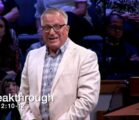Dr. James Beaty: Journey to World Missions
We recently talked with James M. Beaty, a pioneer COGWM missionary. He is 94 years old, but recalled clearly and beautifully the story of his calling and early years in missions. These are his words.
On Sunday night, April 14, 1940, the Lord saved and sanctified me and on Thursday night following He baptized me in the Holy Spirit. Immediately, when I would kneel to pray, these words would form in my mind, “Prepare for the ministry!”
I was born on January 30, 1925, to J.H. Beaty and Annie Revels Beaty. My father’s family, the Beatys, had done fairly well. One of my dad’s sisters had married a veterinarian doctor, one a Baptist preacher and one was a high school teacher. Dad’s uncle, J.M. Beaty, had owned the county newspaper for about thirty years and I had been named for him. On the other hand, the Revels, i.e., the family of my mother’s father, had been listed as “free others” or “mulattos” in every U.S.Census since the first one in 1790.
At the time of my conversion our address was House 46, Smithfield Mill Village, Smithfield, North Carolina, and I was in the ninth grade at school. I finished high school two years later 1942, the last year that North Carolina had an eleven-year school system.
That fall I began college in Wilson because the school had a bus that allowed me to live at home. During college I served as the district director of the Sunday school and the Young People’s Endeavor (YPE), Under the Reverend John L. Byrd, the district pastor of the Erwin District. One year, before I finished college in 1945, I arrived late for the Sunday morning service of the district convention, because I had worked untl 7:00 and caught a bus for the fifty-mile trip. When I got there I entered the building and sat on the back seat.
The Reverend R.P. Johnson was, at that time, our North Carolina state overseer, and he was a great preacher of the word. In those days the Sunday morning service at the district convention was always a missions service. After the sermon, he took the offering this way. He opened his Bible and laid it on the altar and said, “I am not going to ask for any certain amounts this morning. But whatever the Lord lays on you heart, bring it and lay it on the Word.” Almost immediately the Lord said to me and said, “Give all you have with you.” The bus ticket that I had bought that morning was not a round trip ticket. That presented a problem. But it is hard to fight with the Lord, so I took the almost twenty dollars that I had in pocket and started up the aisle. About halfway there, the Lord said to me, “I do not need just your money, I need you and all that you are. Put everything on the altar this morning.” And so I did.
After the service, I spoke with the state YPE and Sunday school director, but did not tell him about my situation. He had a car and almost immediately he asked if he could take me back to Wilson. He may have wanted to talk with me more. And guess what! Three weeks later the finance department of the college called me in and said, “Someone has donated twenty-five dollars, anonymously, on your account.” And that was the only time that such a thing ever happened.
At that point the missions department still had its first general secretary with an office in Cleveland (M.P. Cross). In 1945 he wanted to send me to Jamaica to help in the school there but they were not able to arrange it. But the next year, after my first year in seminary at Vanderbilt School of Religion (now Divinity School), I was sent to Haiti and served a year. After my marriage to Virginia Green, who had been appointed to Angola in 1946 but was never able to get permits to enter, and the completion of our programs in Nashville, her the B.A. at Peabody and me the seminary course at Vanderbilt, we were asked to go to the Dominican Republic, where we served from 1949-1952, and then were sent to Haiti to build the seminary there.
In 1959, after the first graduation in Haiti (a three-year course), we returned to the states and I did the Ph.D. at Vanderbilt. But the year before I graduated, World Missions asked me to serve a superintendent of South America. I was the first to serve in that position over just the continent of South America. They allowed me to work out of Nashville the first year, while I finished my thesis and graduated. In 1953 we moved to Santiago, Chile. It was a great privilege to serve, inspire, and challenge both the ministry and the membership of our churches there. The highlight was the first leadership conference in the world for a whole superintendency. It was held in San Bernadino, Paraguay and lasted a week. On our closing meeting together on Sunday morning we closed with Lord’s Supper and foot-washing. In the testimonies following, Bill Watson, a great missionary and now with the Lord, said, “Esta semana el continente se achicó” (This week….the continent shrunk or got smaller”).


